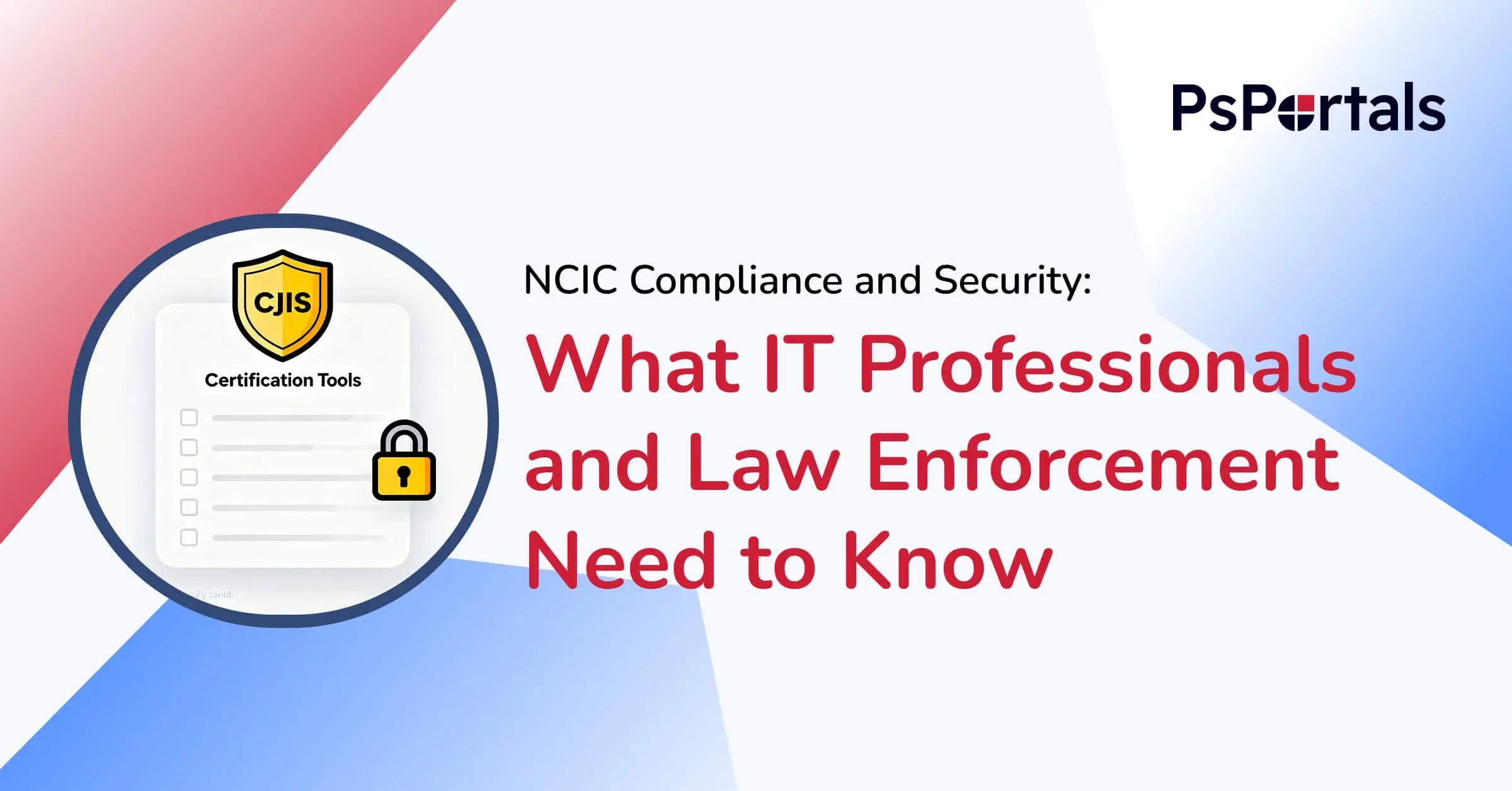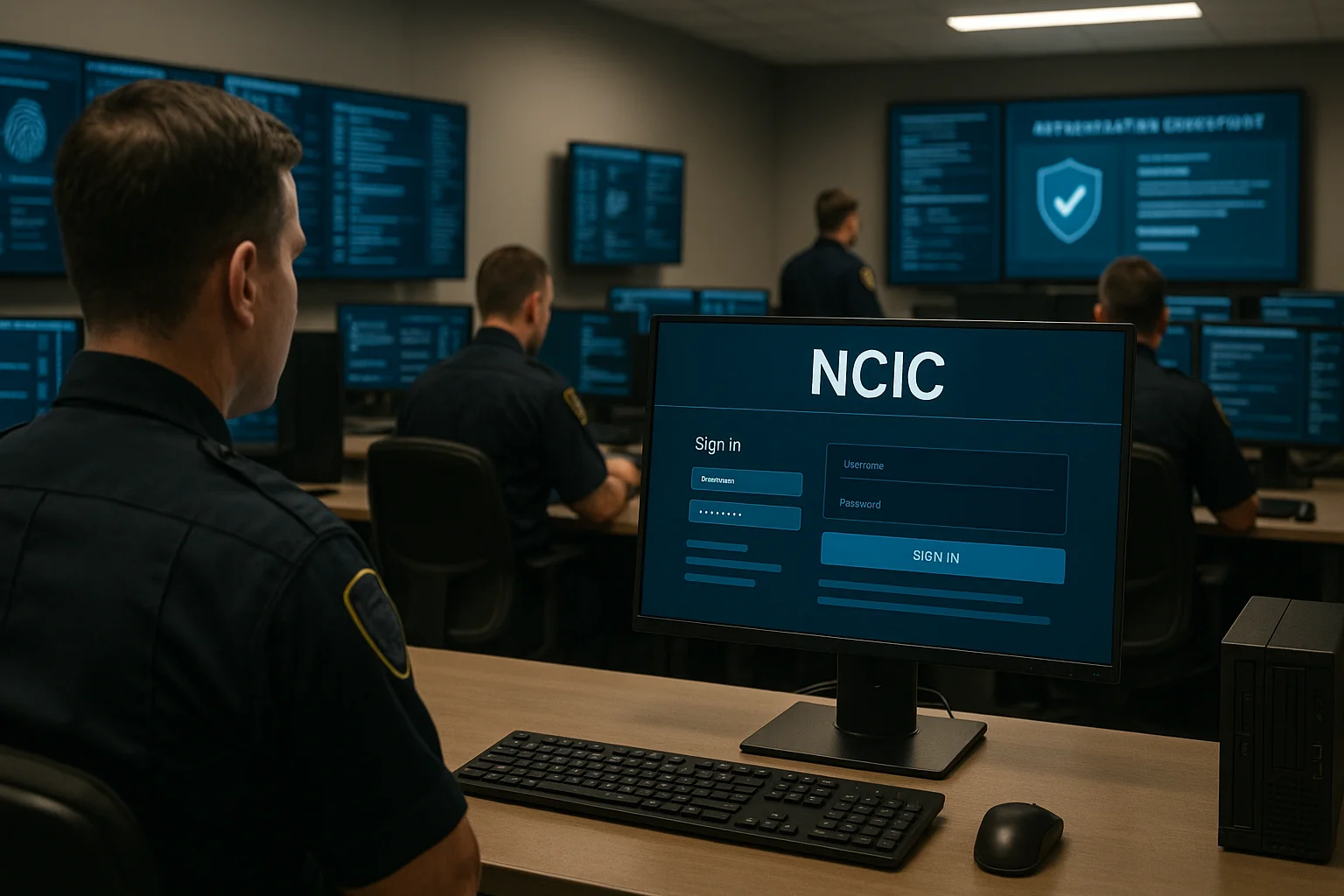
The NCIC, National Crime Information Center, is a computerized network that serves police departments within the United States. Its national purpose is to efficiently collect, process, store, and share all criminal justice information within the domain of all agencies.
This system works with NCIC-compliant software, making it easier to share vital information to help with investigations, arrests, and keeping the public safe.
The CJIS Security Policy sets minimum security standards for Criminal Justice Information. Agencies complying or risking suspension from the backbone of this policy. The policy is modular, i.e., adaptable to new and ever-evolving technologies and threats.
The NCIC supports various communication protocols such as TCP/IP, ASCII Bisynchronous, and IBM System Network Architecture. Terminals must follow the technical standards. This compliance guarantees an interoperable state between federal and local systems.
As of 2024, over 14 million criminal offenses were reported in the U.S. to the FBI’s UCR Program by more than 16,000 agencies. This coverage includes about 95.6% of the U.S. population. This number is significantly large for the information not to be curated.
NCIC Compliance Requirements for Software

Access Controls
Rigorous access controls over the software should be enforced to ensure secure data access. Only identified personnel can view or alter NCIC data. Access is generally restricted through a unique agency identifier (ORI) and strict user authentication measures that preclude exposure to or alteration of sensitive records by unauthorized personnel.
Audit Logging Systems
All systems must maintain detailed audit logs of transactions, inquiries, updates, modifications, and accesses performed. These logs promote accountability and support monitoring and investigations, ensuring compliance with NCIC standards while helping detect potential misuse or system errors.
Transaction Formats
Software must use the right message key codes (MKEs) and transaction message formats. This standardization is necessary for integrating criminal databases, as it allows for consistent and accurate processing of record entries, inquiries, hits, and locate messages from different agencies.
Integration with NCIC
In actual communication with NCIC, the software must observe communication protocols and system discipline provisions concerning interfacing. The confirmation must be proper for invoking the locate message protocol and the timely exchange of reliable information. NCIC database and linkages, such as Vehicle or Canadian Warrant files, need prompt exchange.
Why NCIC Compliance is Essential
Compliance is necessary to ensure the accurate and timely sharing of criminal justice data and the effective integration of criminal databases. It allows law enforcement agencies to work accurately. Here are common consequences that result from inaccuracy and negligence:
Cancellation of Federal Funding
Cuts to DOJ funding have profound effects, including layoffs and shutdowns of community violence programs. With public safety at risk, the efforts to reduce violence, especially in high-need localities, were undermined. These cuts erode trust between the federal government and grantees who rely on multi-year funding commitments.
Civil Liability and Tort Exposure
Wrongful arrests expose law enforcement to potentially expensive lawsuits. According to a report, Long was wrongfully incarcerated for 44 years until he settled for $25 million. Evidence had been hidden, but Duke University helped exonerate and pardon Long after his wrongful conviction. $22 million was to come from the town of Concord, while another $3 million was to be paid by the State Bureau of Investigation.
Operational Cost
During an NCIC/LEADS suspension, agencies face overtime, lost productivity, double entry, and extended case handling time. Excluding overtime and backlog considerations, a medium department conservatively looks at tens to low hundreds of thousands of dollars per month in operational costs.
Data Privacy Breach
Following compliance standards dramatically reduces the risk of a data breach, which is exorbitant to remedy. A data breach translates to lost revenues, interruption of business operations, fines, and harsh recovery expenses. Most organizations tend to increase the price of their products or services after a breach to cover these mounting costs.
The CalGang Records Case
The California Attorney General asked for a public action to restrict access to the CalGang records generated by the LAPD. At the instigation/revocation of the DOJ/state-actor, access to problematic data was restricted or revoked. This illustrates how states can impose restrictions on datasets or revoke access rights upon misuse/integrity concerns.
How Compliance is Audited

1. Hit Confirmation and Response Timing
- Upon receipt of a hit confirmation request from an inquiry, the originating agency (ORI) must provide a substantive response within 10 minutes. This response could be:
- Positive confirmation (hit is valid)
- Negative confirmation (hit is invalid)
- Notice of additional time needed to confirm or reject the hit
- A second request should be sent if the requesting agency does not receive a substantive response within 10 minutes.
- If no response is received within another 10 minutes, the agency must generate a message to its control terminal and that of the originating agency, with a copy sent to FBI NCIC control (ORI/DCFBIWAOQ).
2. Control Terminal Officer’s Role
- The originating agency’s control terminal officer or designee will investigate and ensure compliance with system standards, including proper and timely responses.
- Failure to comply or delays in response may lead to system discipline actions, including possible cancellation of records.
- FBI NCIC will escalate non-compliance issues to the NCIC Advisory Policy Board.
3. Locate Message Requirement
- Any agency detaining a missing person with a record indexed in NCIC, except the agency that initially entered the record, must send a locate message for each confirmed record.
- This ensures the originating agency is immediately informed about the person’s detention and status.
4. Proper Use of Information
- Agencies shall limit the use of criminal history data or information to only that authorized for employment, licensing, or law enforcement investigation.
- Unauthorized use or disclosure can result in audit flags and possible legal consequences.
5. Record Maintenance and Quality Control
- Agencies are required to maintain accurate and up-to-date records in the NCIC system.
- Audits evaluate duplicate records, reject criteria adherence, and proper entry of mandatory fields.
- Agencies must promptly modify or cancel records as necessary following established criteria.
6. Security Risks
- Failure to properly follow system procedures, such as timely confirmations of hits or formatting messages correctly, can lead to ricochets of wrong or outdated information across agencies, increasing risk.
- Non-compliance may cause delays in confirming hits or locating subjects, which can hinder inter-agency coordination, limit effectiveness, and potentially jeopardize public safety.
- Considerable variety in protocols for accessing information creates loopholes that might be exploited; leaking or misusing information compromises privacy and investigation integrity.
7. Impact on Federal Funding
- Agencies that continue to infringe rules could lose access to NCIC, affecting federal funding for criminal justice information systems.
- Failing to respond in time or follow communication protocols can result in being barred from NCIC access, which hinders police work and may affect eligibility for federal grants and assistance.
Checking Vendor Claims: Buyer’s Questions

Is PsPortals compliant with NCIC and related standards?
PsPortals meets all NCIC, NLETS, and III standards while handling their required formatting, business rules, tables, and code. It fully complies with NCIC, Nlets, and Triple I standards. It follows all the necessary formatting, business rules, code tables, and manuals.
Does PsPortals have features to manage users and certification?
The feature provides robust user management and flexible certification level settings. Users can generate examinations from question pools and certification progress..
Can PsPortals handle operator testing and certification online?
Yes, certification exams are given online through any authorized browser. Users can save exams and resume later. Admins can centrally manage all certification info.
Does PsPortals provide auditing and tracking for user activity?
Complete audit trails are included to track user and certification actions.
How does PsPortals stay updated with NCIC changes?
The system supports automatic, server-based updates for code tables and other components to keep everything current
Final Compliance Checklist
-
-
Compliance Standards
-
PsPortals is fully integrated with all the provisions in the NCIC business manuals. It includes all business rules, formatting, and code tables; manual crosstalk with MySQL is completely ruled out, ensuring a full NCIC compliance guard.
-
The software supports the communication standards Nlets requires for effective message exchange.
-
Triple I standards overwhelmingly underline the full compliance of PsPortals products and solutions.
User Interface & Certification
-
The hosted service provider portal has a web-based UI that requires no client-side setup and is easy to configure and manipulate.
-
The application can test NCIC Operator Certification within the Testing & Certification tracks, electronically verifying operator efficiency.
-
Certificates can be created automatically based on the question bank, with configurable passing scores.
Exam Features
-
Exams may be saved mid-progress for learners’ convenience, allowing them to return later.
Audit, Integration & Management
-
Provides complete audit trails to ensure compliance and track all activities.
-
NCIC code table integration and management are supported within the system.
-
NCIP manuals can be integrated into any software for easier management and access.
Notifications & Messaging
-
Automatic notification features help alert users of incoming NCIC messages.
-
Supports logging and retrieval of sent and received messages for record-keeping and analysis.
Additional Features
-
Integrated imaging capabilities as part of the NCIC communication tools.
-
Field pick lists optimized for NCIC requirements, improving data entry efficiency.
-
Secure wireless access to NCIC through the Personal Portal with compatibility for 2-factor authentication.
-
Browser-based Personal Portal works with major smartphone and tablet manufacturers.
-
Centralized and remote administration for maintaining system and user settings.
-
-